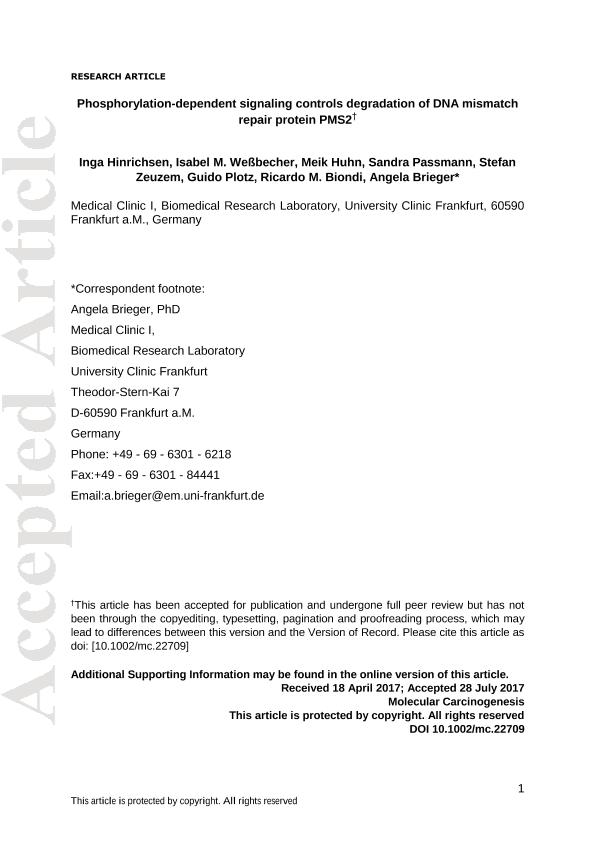Mostrar el registro sencillo del ítem
dc.contributor.author
Hinrichsen, Inga
dc.contributor.author
Weßbecher, Isabel M.
dc.contributor.author
Huhn, Meik
dc.contributor.author
Passmann, Sandra
dc.contributor.author
Zeuzem, Stefan
dc.contributor.author
Plotz, Guido
dc.contributor.author
Biondi, Ricardo Miguel

dc.contributor.author
Brieger, Angela
dc.date.available
2018-07-06T15:52:31Z
dc.date.issued
2017-12
dc.identifier.citation
Hinrichsen, Inga; Weßbecher, Isabel M.; Huhn, Meik; Passmann, Sandra; Zeuzem, Stefan; et al.; Phosphorylation-dependent signaling controls degradation of DNA mismatch repair protein PMS2; Wiley-liss, Div John Wiley & Sons Inc; Molecular Carcinogenesis; 56; 12; 12-2017; 2663-2668
dc.identifier.issn
0899-1987
dc.identifier.uri
http://hdl.handle.net/11336/51496
dc.description.abstract
MutLα, a heterodimer consisting of MLH1 and PMS2, plays an important role in DNA mismatch repair and has been shown to be additionally involved in several other important cellular mechanisms. Previous work indicated that AKT could modulate PMS2 stability by phosphorylation. Still, the mechanisms of regulation of MutLα remain unclear. The stability of MutLα subunits was investigated by transiently overexpression of wild type and mutant forms of MLH1 and PMS2 using immunoblotting for measuring the protein levels after treatment. We found that treatment with the cell-permeable serine/threonine phosphatase inhibitor, Calyculin, leads to degradation of PMS2 when MLH1 or its C-terminal domain is missing or if amino acids of MLH1 essential for PMS2 interaction are mutated. In addition, we discovered that the C-terminal tail of PMS2 is relevant for this Calyculin-dependent degradation. A direct involvement of AKT, which was previously described to be responsible for PMS2 degradation, could not be detected. The multi-kinase inhibitor Sorafenib, in contrast, was able to avoid the degradation of PMS2 which postulates that cellular phosphorylation is involved in this process. Together, we show that pharmacologically induced phosphorylation by Calyculin can induce the selective proteasome-dependent degradation of PMS2 but not of MLH1 and that the PMS2 degradation could be blocked by Sorafenib treatment. Curiously, the C-terminal Lynch Syndrome-variants MLH1L749P and MLH1Y750X make PMS2 prone to Calyculin induced degradation. Therefore, we conclude that the specific degradation of PMS2 may represent a new mechanism to regulate MutLα.
dc.format
application/pdf
dc.language.iso
eng
dc.publisher
Wiley-liss, Div John Wiley & Sons Inc

dc.rights
info:eu-repo/semantics/openAccess
dc.rights.uri
https://creativecommons.org/licenses/by-nc-sa/2.5/ar/
dc.subject
Colorectal Cancer
dc.subject
Lynch Syndrome
dc.subject
Mlh1
dc.subject
MutlΑ
dc.subject
Posttranslational Modification
dc.subject.classification
Otras Ciencias Biológicas

dc.subject.classification
Ciencias Biológicas

dc.subject.classification
CIENCIAS NATURALES Y EXACTAS

dc.title
Phosphorylation-dependent signaling controls degradation of DNA mismatch repair protein PMS2
dc.type
info:eu-repo/semantics/article
dc.type
info:ar-repo/semantics/artículo
dc.type
info:eu-repo/semantics/publishedVersion
dc.date.updated
2018-06-19T15:59:15Z
dc.journal.volume
56
dc.journal.number
12
dc.journal.pagination
2663-2668
dc.journal.pais
Estados Unidos

dc.journal.ciudad
Nueva York
dc.description.fil
Fil: Hinrichsen, Inga. University Clinic Frankfurt; Alemania
dc.description.fil
Fil: Weßbecher, Isabel M.. University Clinic Frankfurt; Alemania
dc.description.fil
Fil: Huhn, Meik. University Clinic Frankfurt; Alemania
dc.description.fil
Fil: Passmann, Sandra. University Clinic Frankfurt; Alemania
dc.description.fil
Fil: Zeuzem, Stefan. University Clinic Frankfurt; Alemania
dc.description.fil
Fil: Plotz, Guido. University Clinic Frankfurt; Alemania
dc.description.fil
Fil: Biondi, Ricardo Miguel. Consejo Nacional de Investigaciones Científicas y Técnicas; Argentina. University Clinic Frankfurt; Alemania
dc.description.fil
Fil: Brieger, Angela. University Clinic Frankfurt; Alemania
dc.journal.title
Molecular Carcinogenesis

dc.relation.alternativeid
info:eu-repo/semantics/altIdentifier/doi/https://dx.doi.org/10.1002/mc.22709
dc.relation.alternativeid
info:eu-repo/semantics/altIdentifier/url/https://onlinelibrary.wiley.com/doi/abs/10.1002/mc.22709
Archivos asociados
